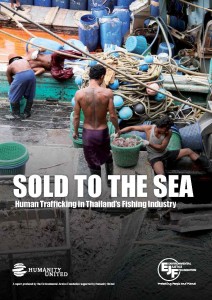Sold to the Sea: Human Trafficking in Thailand’s Fishing Industry
By Environmental Justice Foundation • May 31, 2013Executive Summary
Human trafficking is a global problem. It is estimated that as many as 27 million men, women and children are currently victims of human trafficking around the world.
Thailand is the 32nd largest economy in the world, with a GDP of $377 billion and a growth rate of 5.5 per cent in 2012.2/3 It also has one of the lowest unemployment rates globally, at 0.5 per cent in December 2012.
Thailand’s economy is heavily reliant on labour-intensive industries. However, growing economic prosperity since the late 1980s has seen a decline in the available Thai workforce needed to meet the labour demand.5 In 2009, Thailand’s Ministry of Labour estimated that an additional 116,000 workers would be needed to address the labour-market imbalance. In parallel, the relative lack of economic opportunity in Thailand’s neighbouring countries has made it a destination for migrants seeking employment.
Restrictive employment law and a cumbersome, confusing and expensive immigration process – particularly with regard to low-skilled labour – has caused smuggling networks to flourish. Porous borders, inadequate victim identification and indirect support from some officials further exacerbate the problem.8
Thailand’s seafood industry employs more than 650,000 people with exports totaling $7.3 billion in 2011.9 This includes the seafood processing sector, aquaculture and marine fisheries.
As a result of long hours, low and unpredictable pay, physically demanding work and long periods at sea, the Thai fishing industry is suffering an acute labour shortage, with a shortfall of labour for over 10,000 jobs in 2011.10 This labour shortage is fuelling human trafficking to supply cheap labour for work on Thai fishing boats.
Multiple reports over the past five years have documented abuses of trafficked boat workers in Thailand, including bonded labour, excessive working hours, little or no pay, threats of violence, physical abuse and murder. 12/13 A 2009 survey by the United Nations Inter-Agency Project on Human Trafficking (UNIAP) found that 59 per cent of interviewed migrants trafficked aboard Thai fishing boats reported witnessing the
murder of a fellow worker.
In March 2013 EJF carried out an investigation into human trafficking on Thai fishing boats, including the case of 14 Myanmar men rescued from a port in the Southern city of Kantang. Two days later, another human trafficking victim was rescued from a fishing boat at sea and brought to shore to join the group at the police station. EJF interviewed six members of the group, all of whom had been trafficked and forced to work for up to 20 hours per day with little or no pay. The men were subject to bonded labour, forced detention, physical abuse and threats of violence on the boats and in port. All had been at sea for at least five months and spoke of beatings by senior crew. Two of the interviewees reported seeing a fellow crewmember tortured and executed for trying to escape as well as witnessing the murder of at least five other individuals. Another former boat worker interviewed on a separate occasion in March 2013 witnessed multiple murders and the victims’ bodies being thrown into the sea.
Download the full report here.
Tags: Environmental Justice Foundation, Human Trafficking, Labor Rights, Migrant Workers, ThailandThis post is in: Business and Human Rights, Environmental and Economic Justice, Human Rights
Related Posts









 All posts
All posts